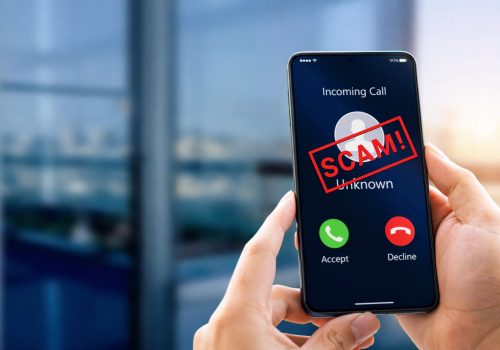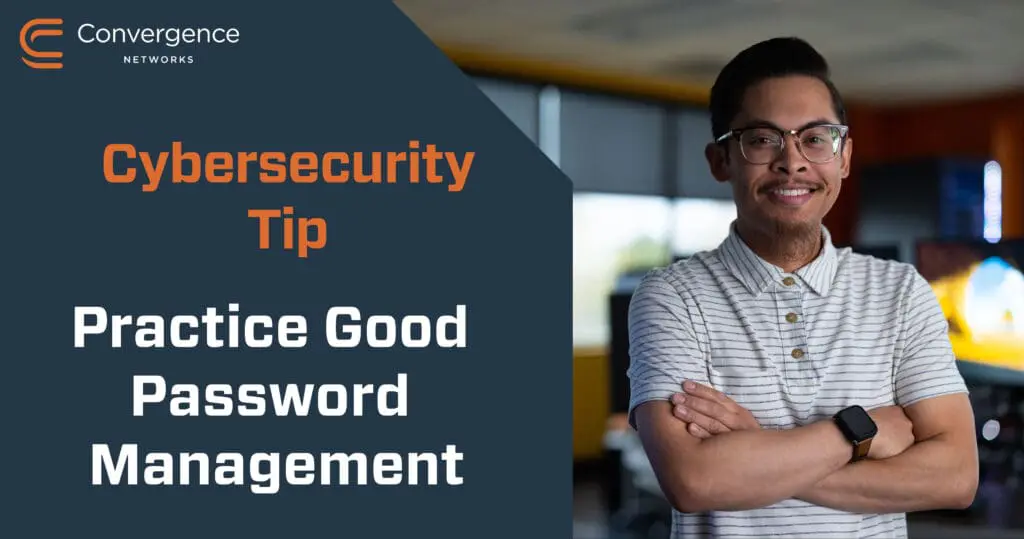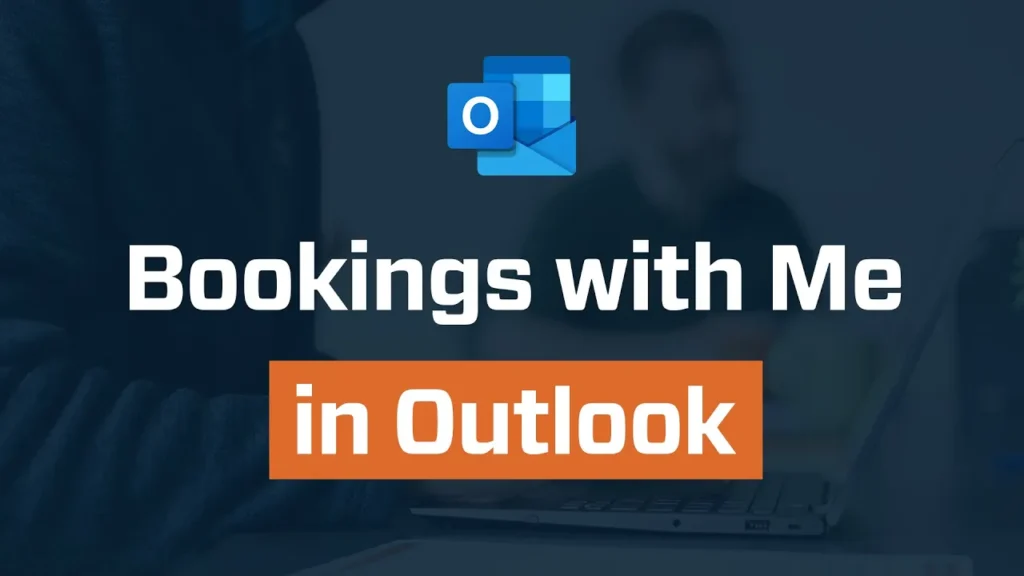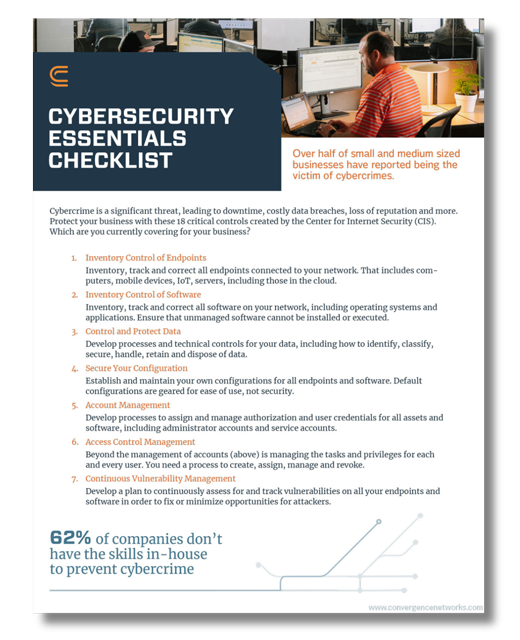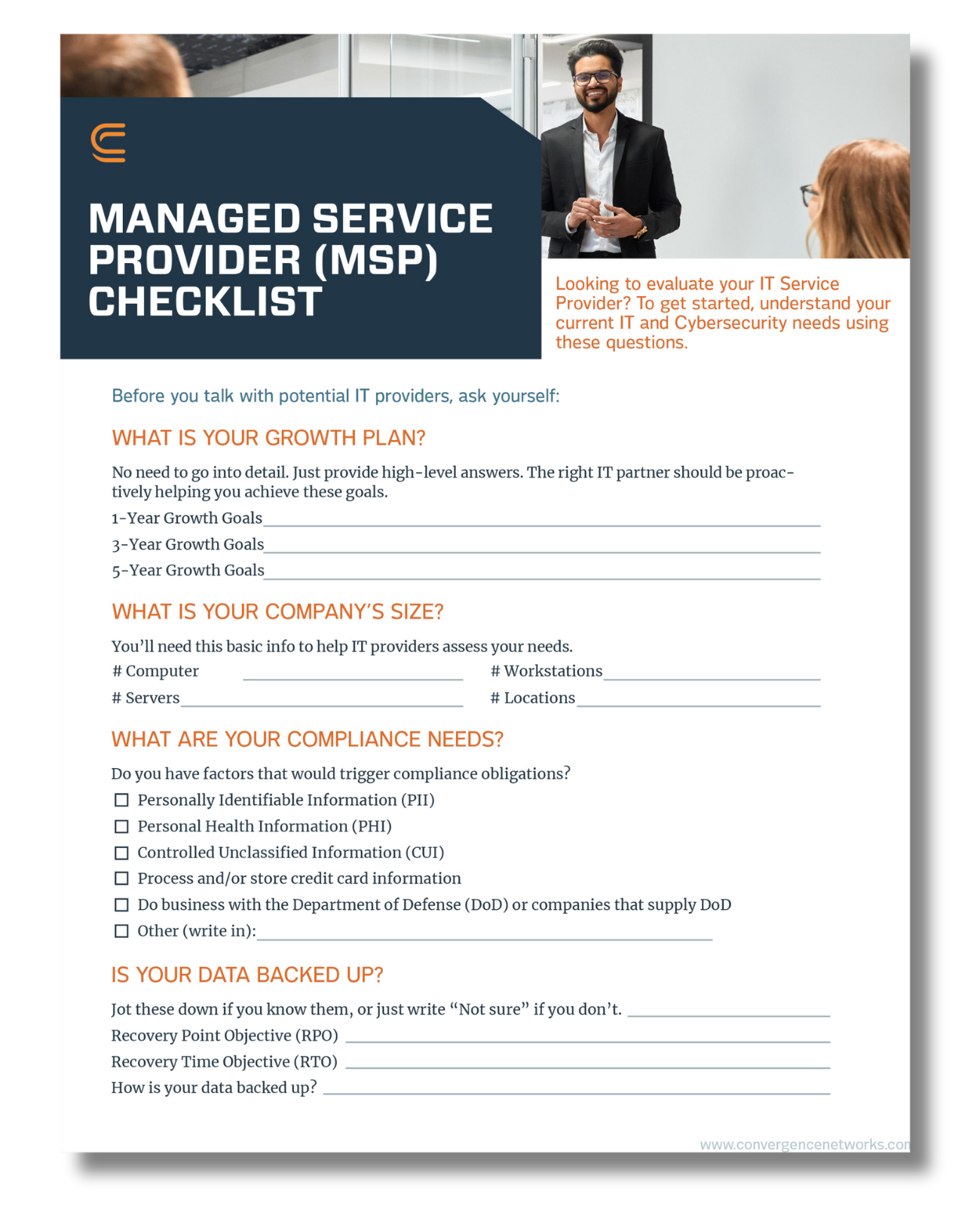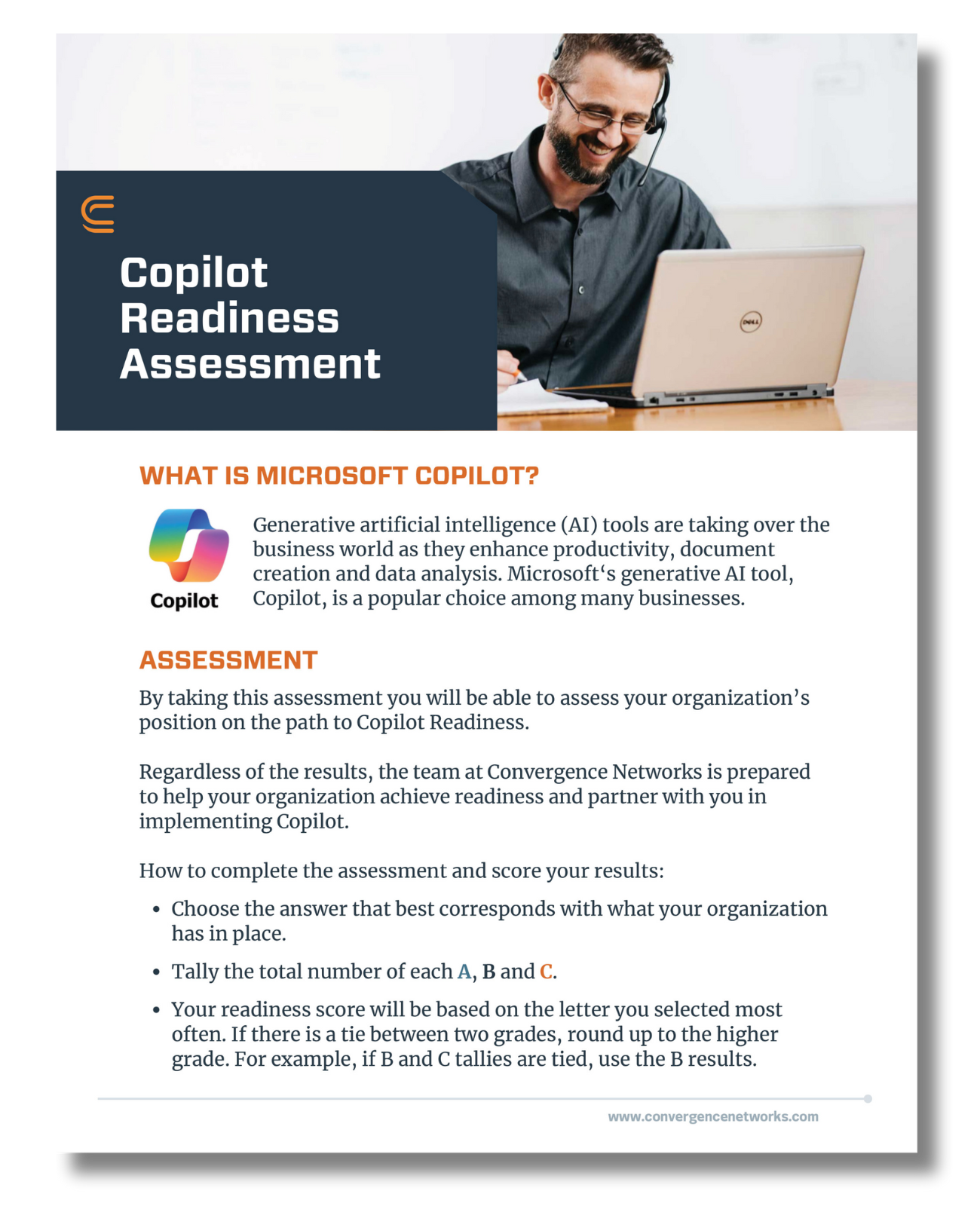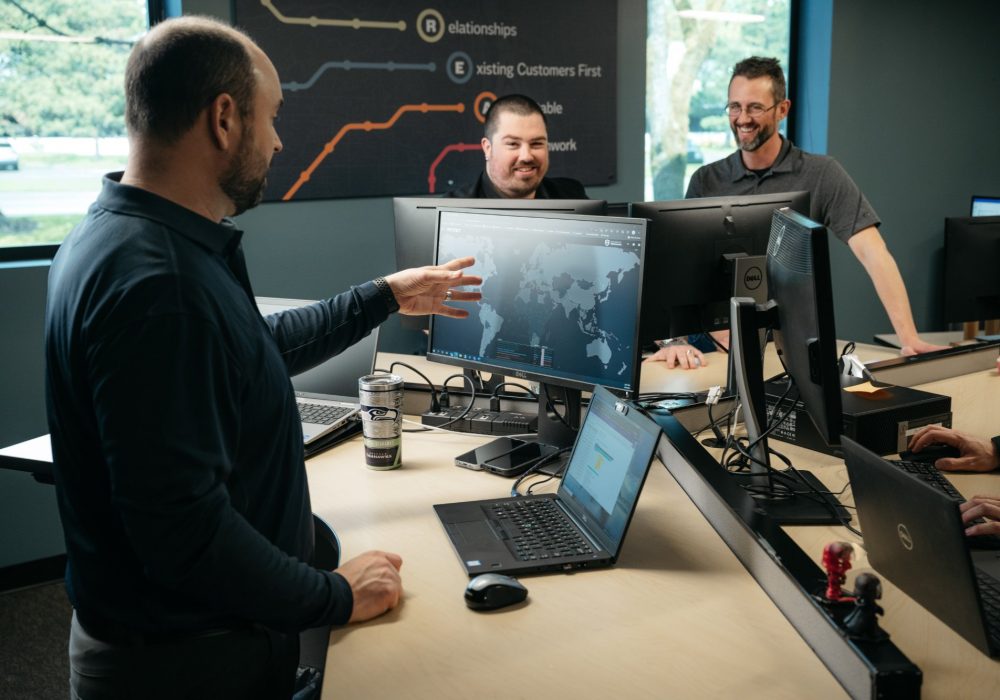Ongoing and One Time IT Security Services
No matter what your organization does or who it serves, it’s a potential target of cybercrime. Even small and mid-market companies are attractive to hackers because these businesses may not prioritize cybersecurity. Unfortunately, industry research shows that every business, no matter its size, should be mindful of IT security.
Convergence Networks specializes in IT security solutions. Our Security Services division offers both ongoing services and one-time engagements.

Four Ways to Ensure IT Security for Your Business
As your IT security partner, Convergence Networks follows four broad steps in safeguarding your critical data and assets:
- Examine: We identify IT security gaps and implement best practices to help ensure your organization is protected
- Equip: We provide advanced cybersecurity tools and a 24/7/365 Security Operations Center (SOC)
- Educate: We help you build a culture of cybersecurity awareness with continuous training for your team
- Eliminate: If you are breached, we eradicate the threat and help get you back up and running quickly
What Can IT Security Do for You?
The benefits of IT security are clear. With managed and professional IT security services from the Convergence Networks team, you can:
- Detect threats faster
- Adopt a well-developed IT security program for your business
- Keep security awareness top-of-mind with employees
- Respond quickly to cybersecurity incidents if they occur
Zero Trust IT Security
With Zero Trust security from Convergence Networks, you can protect your environment from internal and external threats. This minimally invasive approach offers you a high degree of visibility and control while only allowing verified applications into your network.
Rely on application controls to keep out anything that hasn’t been explicitly approved; including programs, malware and ransomware. Our technology protects your data by making it harder for bad actors to access. Plus, storage control solutions give you the ability to block unauthorized removal of your data.
Count on Us for Compliance Concerns
The Convergence Networks team offers expertise in meeting these compliance frameworks:
- CMMC
- NIST CSF
- PCI
- HIPAA
- FERPA
- Cybersecure Canada
- UK Cyber Essentials and Cyber Essentials Plus
- SOC 2
- ISO 27001
The Tools You Need for IT Security
IT security tools, also known as cybersecurity tools, are software and hardware solutions designed to protect computer systems, networks and data from unauthorized access, use, disclosure, disruption, modification or destruction. Used together, these tools play a crucial role in safeguarding sensitive information, ensuring business continuity and mitigating the risks of cyber threats.
The specific tools used by your organization will depend on your size, industry, budget and risk profile. It’s important to take a layered security approach that combines multiple tools and techniques to provide comprehensive protection for your organization. An IT security consultant can help organizations assess their current needs and recommend the most appropriate tools to meet their specific requirements in terms of security.
Convergence Networks offers a robust line-up of IT security tools, including:
- Intrusion detection/prevention systems (IDS/IPS).
- Virtual private networks (VPNs).
- Web application firewalls (WAFs).
- Antivirus/anti-malware software.
- Endpoint detection and response (EDR) solutions.
- Managed detection and response solutions.
- Patch management solutions.
- Security information and event management (SIEM) solutions.
- Security orchestration, automation and response (SOAR) solutions.
- Multi-factor authentication (MFA).
- Single sign-on (SSO) solutions.
- Cloud security posture monitoring.
- Email encryption solution.
- Web content filtering.
- Password managers.
- Security awareness training platforms.
IT Security: A Journey, Not a Destination
In today’s landscape, IT security can’t be a “set it and forget it” task. It must adapt according to evolving threats.
Also, you should keep in mind that cybersecurity is not just the IT department’s concern: It’s a responsibility everyone in your organization shares. To be truly comprehensive, your IT security should include security awareness training, phishing simulations and penetration testing.
Put your business on the right path with IT security from Convergence Networks. Keep up with current threats by making the necessary modifications and taking advantage of today’s advancements in cybersecurity. Let’s work together to build a more secure tomorrow for your business with IT security services. Contact us today to find out more about our services and keep your business, customers, employees and partners safe.
Why Choose Convergence Networks for IT Security?
- Our team includes hand-selected professionals who understand how to serve customers. We provide leading IT expertise and a genuine interest in solving your technical challenges so your organization can grow.
- As a provider of both IT and cybersecurity, we know how to balance the need for security with efficiency.
- We have an in-house 24/7/365 SOC (Security Operations Center) with real people behind the screen monitoring your network and ensuring that alerts are handled.
- Our comprehensive suite of advanced cybersecurity tools have been tested and selected specifically for your business needs.
- If you have a breach or incident, we have the experience to get your operations back up and running quickly.
- We customize our services to fit your needs.
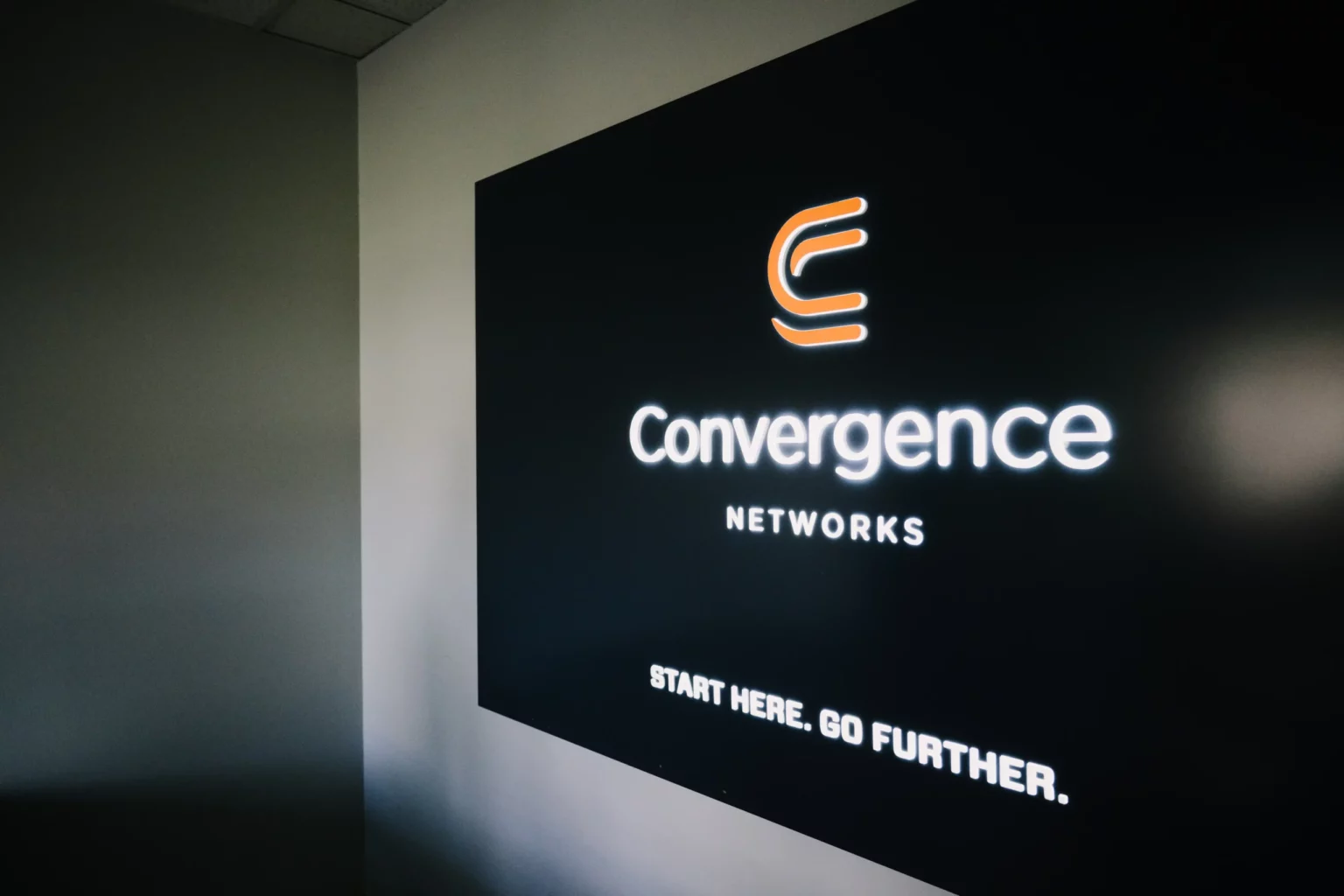
Frequently Asked Questions About Our IT Security Services
As a set of cybersecurity strategies, IT security works to prevent unauthorized access to an organization’s assets, including its computers, networks and data. IT security maintains the integrity and confidentiality of any sensitive information an organization holds and blocks cybercriminals’ access to that information.
IT security consulting, often referred to as cybersecurity consulting, is a specialized field within the IT industry. It focuses on evaluating the security risks and vulnerabilities of an organization’s computer systems, networks, and software. Security consultants, who might also be called information security consultants, network security consultants, or database security consultants, design and implement tailored solutions to safeguard against cyberattacks and other digital threats.
IT security aims to prevent the loss of:
- Data availability.
- Data integrity.
- Data confidentiality
In fact, 93% of companies that experience a cyber breach have significant losses, from downtime to loss of critical data. As you research IT security further, you’ll discover that most security practices and controls can be traced back to preventing losses in one or more of these areas.
Cyber security services providers offer cyber security to other businesses as a service. Cyber security Service Provider (CSSP) is also a set of specific certifications issued by the Department of Defense (DoD) to designate certain levels of knowledge and experience.
Working with a cyber security provider allows your company to leverage a more robust set of security protocols. They can run tests to find vulnerabilities, monitor networks for intrusions and even respond to incidents. Be aware though: Not all cyber security service providers offer the same set of services and their methods and costs can vary greatly.
A managed cyber security service provider (MSSP) bundles these security services into your managed service agreement for a flat monthly fee. You’ll get proactive monitoring, infrastructure expertise and response and remediation in addition to the help desk, training and other managed service components. The best MSSPs customize their services to meet the needs of your business, so you never pay for services you don’t need.
Here are a few questions to ask any IT security provider you’re considering:
- What is your experience in our industry?
- What compliance frameworks do you have experience with?
- Can you provide case studies or references that demonstrate your success?
- What security-related certifications have you earned?
- Do you have a team of in-house security experts?
- Can you come onsite if needed?
- How do you balance the need for security with operational efficiencies?
- What cybersecurity tools do you use?
- If a cyber incident takes my business offline, can you assist in getting us back up and running?
For more questions to ask, download our free Choose IT Support Checklist.
IT security consultants specialize in protecting organizations’ digital assets and information from cyber threats. Their responsibilities typically include:
- Risk assessment and vulnerability analysis.
- Security strategy and planning.
- Implementation and management of security solutions.
- Security awareness and training.
- Compliance and governance.
- Incident response and remediation.
- Staying up to date with the threat landscape and IT security trends.
Cyber security managed service provider is another name for a managed cybersecurity provider or MSSP. They differ from a CSSP because the security services are provided as part of end-to-end IT coverage. MSSPs:
- Assess your infrastructure for risks, gaps and vulnerabilities to continually assure your security.
- Close any gaps and provide recommendations to implement specific security and productivity improvements.
- Monitor your system and support your team 24/7/365.
- Proactively respond to attacks, usually blocking them before they breach your system.
- Provide ongoing training for your staff who are the #1 weakest link in any security chain.
With a cyber security managed service provider, these services and more are packaged into your monthly fee, so that you can plan better for meeting your company’s technology needs.
Providers that determine and address your cyber security risks are offering cyber security assessment services. Every business should conduct some level of cyber risk assessment. But the types of assessments you need will vary based on your business, company size, industry and your risk tolerance.
The most common cyber security assessment services include:
- Vulnerability assessment to discover potential weak spots inside and outside your network that could be exploited.
- Penetration testing. A “practice” cyber attack is run by authorized cybersecurity experts (“white hat hackers”).
- Network audit and access review, which can determine what is on your network, finding unauthorized software or hardware as well as performance or licensing issues. An access review looks at who has permissions to access or make changes to your network.
- Compliance audit reveals how well your company is obeying the rules, regulations and laws that relate to your particular industry. A compliance audit will find out, from common PCI compliance (required by any business that accepts credit card payments) to specialized requirements for defense contractors. Compliance audits look both at what is happening inside your business and with any external partners or vendor relationships.
Zero Trust architecture is a cyber security model where no one is trusted by default from inside or outside the network. Verification is required from everyone trying to gain access to resources on the network.
Zero Trust architecture stops and blocks malicious software and other applications that have not been specifically authorized. Zero Trust security services allow you to define what software, scripts, executables and libraries can run on your company’s endpoints and servers. This typically involves a combination of:
- Application whitelisting. This process blocks everything unless it has been explicitly approved. This means no one can download and install any program or perform any function unless it’s on the list. This not only protects you from malware or other ransomware but also from the use of your systems for non-business purposes (e.g., crypto mining).
- Ringfencing. A technology that protects your data from exploited applications and files by creating a fence at the most granular level around the applications that run your system. This essentially eliminates attack vectors from a cybercriminal’s path.
- Storage control. A solution that allows you to stop users from exporting or uploading files to the internet and external storage, like USB drives.
Both multi factor authentication (MFA) and two factor authentication (2FA) validate that you are who you say you are. In fact, all 2FA is MFA. But not all MFA is 2FA.
The difference between multi factor authentication and 2fa is the number of forms of authentication you will require to prove you are a legitimate user to that site. Two is the minimum while more than three tends to get in the way of productivity. As its name suggests, 2FA requires two forms of authentication while MFA covers anything that requires two or more.
Remember your last log in? You were asked to provide a username and password. Together, those are one factor of authentication. Taking this a step further, 2FA asks for one more factor, such as answers to previously asked security questions. These all fall into the “something you know” category.
In addition to “something you know” most MFAs also require “something you have” or “something you are. ” “Something you have” is usually your cell phone. Your login triggers code to be sent to your phone. You enter that code to access the system. There are more robust methods, such as using an authenticator app or token device. Any of these will provide an additional layer of security over simply providing information. “Something you are” is usually a fingerprint or face scan, but any form of biometrics fits in this category.
So don’t get caught up in the terminology multi factor authentication vs 2fa. The important thing is that you implement more robust authentication methods to protect your business.
A zero day attack involves a cybercriminal exploiting an unpatched or unknown vulnerability for the first time (aka a zero day vulnerability).
Some examples of zero day exploits include:
- New or undetected malware.
- A known vulnerability that had never been exploited before.
- A previously unknown vulnerability that is exploited.
In some cases, a system’s vulnerability is known, but it is not known how that vulnerability could possibly be exploited. Vulnerabilities can sometimes be discovered once people figure out how to exploit them. This is why there is often a gap between a zero day vulnerability and a zero day exploit.
Organizations and websites track critical vulnerabilities and exposures to distribute to others. They maintain updated lists of these and then release patches that will fix the system flaws. Once the patch is released, it is no longer considered a zero day vulnerability.
You might be surprised to learn that an everyday, run-of-the-mill antivirus or anti-malware software can’t protect you against zero day attacks. These software tools can only look for what they know for certain is out there, and because zero day exploits occur from the three examples listed above, IT systems are never fully protected all the time. This is why it’s important to make sure your company is taking cyber security seriously.
A vulnerability can be defined as a weak spot in a system. Cybercriminals gain access to a network through IT vulnerabilities. Not all weak spots are in the source code itself, and it is virtually impossible to have no weak spots.
As it turns out, the biggest vulnerability for the majority of companies are their people.
Some human examples of vulnerabilities include a human response to phishing emails or weak passwords, while technological vulnerability examples include weaknesses in the software code of a program or software that hasn’t been updated or patched.
Exploits require vulnerabilities to exist, which is why preventing vulnerabilities is critical for the health of your organization. A cybercriminal uses a vulnerability to exploit a system.
In today’s world, bad actors don’t need to be sophisticated coders or computer experts to exploit a vulnerability — especially of the human kind. Bad actors can purchase automated tools to take advantage of weaknesses on a grand scale.
There’s plenty of data available on the dark web to trick your team into making a mistake and letting criminals in.
It’s important to remember that cyber threats aren’t just something big corporations and governments need to worry about. In fact, 46% of all cyber attacks are aimed at small businesses. Unfortunately, evidence shows that small businesses are more vulnerable to attacks, oftentimes because they may lack the security resources to protect themselves as well as they should.
We provide both one-time IT security projects (e.g., vulnerability assessments, incident response) as well as ongoing IT security guidance and support by trained cybersecurity experts.
Our IT outsourcing firm specializes in advanced cybersecurity solutions, protecting your business from evolving digital threats. Our outsourced IT services include regular updates, threat monitoring and incident response, significantly reducing the risk of cyberattacks. With us, your data and operations are safeguarded by state-of-the-art security measures, ensuring peace of mind and continuous business operations.
Most, if not all, compliance regulations require your organization to have robust cybersecurity measures in place and ensure your adherence to them. We’ll help you reduce the risk of cyber threats and data breaches. When we implement robust security controls at your organization, your sensitive data will remain protected.
Penetration testing is a simulated cyber-attack against your organization’s network, applications or systems. It is used to identify security weaknesses before actual cybercriminals can exploit them. When you simulate a real-world attack, penetration tests reveal vulnerabilities. This enables you to enhance security before an actual breach happens.
However, a penetration test is just one component of a comprehensive cybersecurity framework. To fully protect your business, it should be integrated with other security measures and practices.
Convergence Networks specializes in leading IT security solutions. Count on our Security Services division for both ongoing services and one-time engagements. One-time engagements are tailored to address specific challenges or projects, such as compliance assessments or vulnerability testing. Whether you need comprehensive, long-term protection or targeted, short-term solutions, we have the expertise to meet your needs.
Convergence Networks, a cyber security company, can give you support and guidance for many cybersecurity compliance frameworks:
- CMMC (DFARS)
- NIST CSF
- PCI
- HIPAA
- FERPA
- CyberSecure Canada
- UK Cyber Essentials
- SOC 2 and ISO 27001
Our compliance experts are well-versed in each framework’s requirements and work closely with your organization to ensure all requirements are met. They also help you protect sensitive data, maintain regulatory standards and secure a competitive advantage in your industry.
We know achieving compliance can be complex and stressful, but our team is here to help you. We pride ourselves on the ability to simplify the process. Our solutions are tailored to your organization’s needs. We start by assessing your current security posture and identify any gaps. Once that is complete, we develop a roadmap to guide you to compliance. We offer continuous support and education to ensure your team is prepared to meet and maintain compliance standards. Our team also helps you reduce the risk of fines, lawsuits and loss of consumer and shareholder trust.



